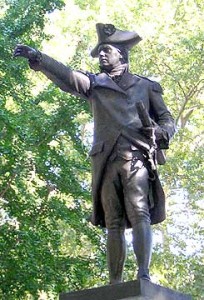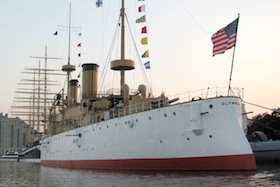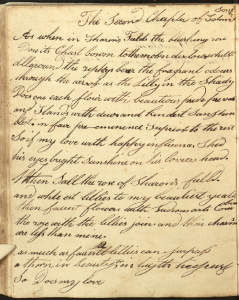
An Interview With Tim McGrath – Author of John Barry An American Hero In The Age Of Sail – Part 1
In late December of 2012, Tim McGrath, author of John Barry, An American Hero In The Age Of Sail, reviewed here, was kind enough to give this blogger almost two hours of his valuable time (he’s busy finishing up a new book, and running a business). Because of the length of the interview, this is the first of three parts.
1. Background & Overview
Martin: Mr. McGrath, thank you for making time for this interview. I like to do these interviews in two or three segments. In the first part, we’ll talk about background and general information, In the second we’ll talk about the book itself, and then we’ll close up with your next project, etc.
Tim McGrath: Ok, let’s go.
Martin: What sparked your interest in naval history? For me it was reading Patrick O’Brian and C.S. Forester.

Tim McGrath: I was a history major, but not a very grand student, to be honest. … I liked the digging into some parts of history in some of the classes, but I was very happy that my kids took after my wife’s approach to scholastics and not mine. But I always had a real love of history. Barry got introduced to me when I was about four years old. My dad was quite in love with it [history] himself, and we were behind Independence Hall and there was a statue of John Barry back there and I asked my father, “What’s this guy pointing at?” Instead of saying, “He’s pointing at the enemy frigates in the distance or he’s pointing along the path of the Delaware as it heads down the Jersey shore and the capes.” Instead, … he said, “He’s saying, ‘I’m buried over there’,” and then took me a couple blocks down the street to my first cemetery, which was interesting.
Being third generation off the boat from Ireland, he was always kind of a figure. I would find myself in bookstores, when a new book came out on the Revolution, going back into the indexes to see if they would mention this guy and rarely found anything at all.
About 10 1/2 , almost 11 years ago, I actually reached out to the Independence Seaport Museum library in Philadelphia. It’s a great museum, it’s one of the best kept secrets in Philadelphia, although the current CEO is doing wonderful things to make people realize what a treasure they have in their back yard. I spoke to the librarian at the museum who was then Megan Frasier, she’s now at UCLA. I said I know you can’t take out books from the museum library, but if you have any of the out of date books on John Barry, I would love to set up a couple of appointments to come in and read them. And Megan very nicely said, if you’re really that interested in him, we have his family papers.
So, I went down there and just got hooked, Martin. Your allusion to Forester and O’Brian aren’t lost on me. My dad had old 1930’s copies of the Hornblower books when he was younger and I started reading them when I was 9 or 10. Obviously the O’Brian books since. The thing that surprised me, and you having read Forrester and O’Brian, you know Barry’s life kind of reads as though he could have been a peer of them [the authors’ characters], had he been English-born and not Irish. There’s so much that happens to him on land, even the soap opera aspects of anything in history that men and women will dive into, and just his relationships with his in-laws, and the different things he did after the Constitutional Convention were things that I never knew and just had a ball with.
Martin: Definitely fascinating stuff. You have gotten into my next question, which was to ask about the Independence Seaport Museum So, you went there specifically to research Barry, and that is when you stumbled on the family papers. You weren’t there to research something else?
Tim McGrath: No, I specifically went down there for that. We’d been there before. I had taken my kids to the museum when they were younger. even before it moved to the Delaware waterfront. It is a marvelous place. It has terrific exhibits, and ongoing exhibits. The curator Craig Bruns did one a couple years back on tattoos. I remember thinking to myself, that kind of sounds like an odd thing, I wonder how that will do? And it went viral and national. They have some really bright people down there, like John Brady, the president. Actually when I first met him, he was running the build-a-boat workshop. He’s done a marvelous job of putting together great programs. …
The library is terrific, I don’t know a library that has a better view. It is on the second floor and has one wall that is pretty much all window, with a phenomenal view of the waterfront. The museum is connected to Commodore Dewey’s  flagship from the Spanish American War, The Olympia, which is in very dire straits. there is a submarine, the Becuna, there for touring, and then you look right over the water to Camden and there’s the battleship New Jersey, and just a beautiful view of the river and different boats coming in and out. It’s a nice place to just go hide! The library is wonderful, they have documents that go back to the 1600s. the Barry-Hayes papers are named after John Barry and his nephew Patrick Hayes. They stretch from before the Revolutionary War well into the 19th Century, just fascinating stuff. The things that you picked up on were things that you could [only] get looking in them. His will is in there; in the middle of the will is the provisions for his slaves. In this day and age, and being Irish, I was going, “Damnit Jack, don’t do this “¦” But it was obviously pertinent to the times.
flagship from the Spanish American War, The Olympia, which is in very dire straits. there is a submarine, the Becuna, there for touring, and then you look right over the water to Camden and there’s the battleship New Jersey, and just a beautiful view of the river and different boats coming in and out. It’s a nice place to just go hide! The library is wonderful, they have documents that go back to the 1600s. the Barry-Hayes papers are named after John Barry and his nephew Patrick Hayes. They stretch from before the Revolutionary War well into the 19th Century, just fascinating stuff. The things that you picked up on were things that you could [only] get looking in them. His will is in there; in the middle of the will is the provisions for his slaves. In this day and age, and being Irish, I was going, “Damnit Jack, don’t do this “¦” But it was obviously pertinent to the times.
He was quite a writer, but not nearly as prolific as John Paul Jones, nobody was. Jones was his own press agent. Barry’s memorandum about his voyage to China was full of the do’s and don’ts, and what to expect. It is like getting your driver’s permit and having to read the manual. It is fascinating stuff.
Martin: You’ve written a terrific book. The older I get, the less patience I have for reading things that aren’t good. Now having spent the last 5 years reading almost nothing but non-fiction, I’ve become a bit more discriminating. I think John Barry, An American Hero, rivals much of the academic scholarship that is out there, and is a good deal more readable. How long did this book take to write? What percentage of it would you say was based on original sources?
Tim McGrath: First, thanks for the compliment. Second, I was well-coached with this project. I had a history professor, Jim Hilty, who just retired from Temple. I loved taking classes under him, he was and remains a very engaging story-teller. He is still called upon for his expertise. He was the guy that shoved me into this. I called him up when I was about 6 months into the Barry Papers, and told him that if he had a graduate student in need of reasearch project, you couldn’t do better. You can’t make this stuff up. It really is like a Hornblower or a Jack Aubrey character. He said, let’s meet. Here’s how you do this. You get an article published and that sort of gives you dibs on the subject matter, and then you write a book.
And I said, “I’m running a business, I don’t have time for this!”
He said, “You work on it from 10pm to 2am and on weekends.”
I said, “10 to 2?”
And he laughed and said, “10 to 2, well, you’re over 50 so there’s some things you don’t do as much between 10 and 2!”
And he introduced me to Greg Irwin – who, God bless him, has read every word of the Barry book and every chapter I’ve thrown at him on my new book on the Continental Navy. He’s a remarkable historian, and watching him lecture is like watching Sandi Kofax pitch or Leonard Bernstein conduct. I was very lucky getting his help.
And I’ve strayed off your question, haven’t I?
Martin: That’s alright, we’ll call that color!
Tell me about what it’s like to read something that your subject wrote in his own hand? How does that work? These things are irreplaceable and it may be that no one else has read them in decades.
 Tim McGrath: That was the part that was fun in studying history from the time I was a kid. “¦ Barry was not very well educated, obviously he came from the days of the penal laws in Ireland, and didn’t have much more than the equivalent of a third or maybe a sixth grade education. He was really kind a Horatio Alger figure determined to improve himself. I will confess to this, though. When I started I wanted to see the originals of everything. But my eyes are bad enough already, and the further I got in the search, when they’d say “we have a transcript,” I would say, “that’s terrific!.” You could go a bit crazy with it, you know how the S’s look like F’s and so on”¦ But it’s still fun to read them. The other thing, is that he’s got documents not just in his own hand, but also documents from Washington and Franklin and Robert Morris. And just as important to me were some of those written by his sailors and other people. That got to be a lot of fun. I think my favorite correspondence with Barry, with another person from that era, was with Anthony Wayne.
Tim McGrath: That was the part that was fun in studying history from the time I was a kid. “¦ Barry was not very well educated, obviously he came from the days of the penal laws in Ireland, and didn’t have much more than the equivalent of a third or maybe a sixth grade education. He was really kind a Horatio Alger figure determined to improve himself. I will confess to this, though. When I started I wanted to see the originals of everything. But my eyes are bad enough already, and the further I got in the search, when they’d say “we have a transcript,” I would say, “that’s terrific!.” You could go a bit crazy with it, you know how the S’s look like F’s and so on”¦ But it’s still fun to read them. The other thing, is that he’s got documents not just in his own hand, but also documents from Washington and Franklin and Robert Morris. And just as important to me were some of those written by his sailors and other people. That got to be a lot of fun. I think my favorite correspondence with Barry, with another person from that era, was with Anthony Wayne.
They got to know each other in “˜78 when Barry brought a couple of barges down from above Philadelphia to Wilmington to try to harass British shipping. Washington had sent Wayne to Wilmington with the idea of getting over to Jersey somehow and going on a cattle rustling venture to get beef on the hoof for Valley Forge. With Wayne, at the end of the war Barry sent a letter to Wayne asking if he could lend him $200. Wayne’s response reply is over at Haverford College (they have a wonderful collection of documents from that era.) His reply was, “Look, I’d be glad to lend it to you, but I don’t have the money either.” That gave you an idea of what these men were dealing with at the time.
Martin: Yeah, even Washington was wealthy with land and property, but was pretty cash poor.
Tim McGrath: Yeah.
Martin: What was the most exciting bit of original source material that you found and how did that come about?
Tim McGrath: That’s easy. Barry’s nephew – Patrick Hayes’ journal. Patrick and his brother came to America in 1787 after their parents died. His mom was Barry’s sister and Barry went on one of the first voyages to China. Patrick wrote a journal describing everything. It really is this 17 year old kid, wide-eyed telling about the voyage, the shock of the third mate committing suicide, his visit to Africa and Cape Verde and Cape Town. He had a very chilling description, he mentions at the edge of the town, which is a marvel to him, being filled with exotic animals but being built like a city, is that they have three gibbets at the edge of the town: one for soldiers to be hanged, one for sailors to be hanged, and one for African natives to be hanged. Because you obviously would not hang a black man on a white man’s gibbet.
He describes the storms, some bats in the South China Sea with 7 foot wing spans, these long striped snakes swimming along side the ship. It’s remarkable.
When the journal ends, he includes some bits from the Song of Solomon. His last entry is: Madam full of shame”¦.
It only leads one to believe that he made a visit to brothel and didn’t tell his uncle. We’ll never know why he is full of shame.

It’s ironic, because when he was an older man, his documents are very colorful with a good bit of blue language. He became quite a sea captain and a maritime figure in Philadelphia in his own right.
In fact, you can read his account for yourself. Villanova University had a project to digitize much of the Barry-Hayes papers, so you can just go online and read them.
 The posts are coming!
The posts are coming!


6 comments
I liked this interview very much and plan to order the book. I’m also sending to friends who might be interested. Thank you!
[Reply]
Ann, thank you so much. I am pleased that you like interview. Tim is a heck of a nice guy and was awfully generous with this time.
[Reply]
Have read both of Tim’s books, great reads and great history. My ancestor Ebenezer Bacon served on the Continental frigate Hancock under Capt. John Manly, his brother my third great grandfather Samuel Bacon fought in the Battle of Saratoga under Gates and Benedict Arnold.
[Reply]
Martin Reply:
July 11th, 2015 at 2:16 pm
Wow, that’s cool!
[Reply]
Greetings, I just finished Give Me a Fast Ship. My family has been in the Delaware Capes and the Philadelphia area since the beginning. My mother and her sister are daughters of the revolution. My ancestors were Delaware River and Bay Pilots up until 1953. We still have a home in our family in Claymont, Delaware that was built in 1752. Today I live in Maine and have been a boat captain since 2009. Just ordered the book about John Barry. Will definately swing through the library when heading south in October.
[Reply]
Martin Reply:
July 16th, 2015 at 12:21 pm
Welcome Bruce,
Thanks for stopping by. Sounds like your family has quite a history! I think you will enjoy the book on Barry, When you finish it, you can compare notes with me 🙂
[Reply]
Leave a Comment